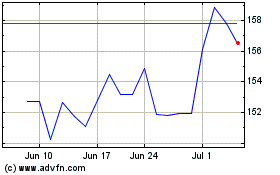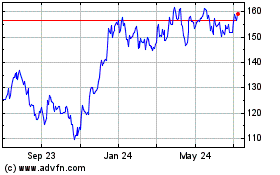PNC Acquiring RBC Unit - Analyst Blog
June 20 2011 - 9:15AM
Zacks
PNC Financial Services Group Inc. (PNC) is
purchasing RBC Bank (USA), the U.S. retail banking subsidiary of
Royal Bank of Canada (RY) and have signed a
definitive agreement in this context. The acquisition of this RBC
banking business for $3.45 billion would help PNC to expand its
footprint in the Southeast markets. The purchase price of the RBC
unit, which has approximately $25 billion of assets, represents
$112 million discount to tangible book value.
The Deal Details
The deal would augment PNC’s network with additional 424 RBC
branches located in North Carolina, Florida, Alabama, Georgia,
Virginia and South Carolina. This would result in PNC becoming the
5th among U.S. banks with 2,870 branches. Moreover, PNC would
inherit $19 billion in deposits and $16 billion in loans from this
transaction. In addition, PNC would also acquire certain credit
card assets of RBC Bank, (Georgia) National Association. However,
Royal Bank of Canada will continue providing other U.S. operations
such as capital markets and wealth management services.
The purchase price is however, subject to adjustment at close
for actual net tangible asset value delivered, according to the
terms of the agreement. PNC has the option to pay up to $1.0
billion of the consideration in common stock, or 3% of PNC's
outstanding common shares based on PNC's closing price of $57.79 on
June 17, 2011.
The cash part funding will be made by PNC with available cash,
debt issuance and a preferred stock offering. The part to be paid
in stock will be limited to such an extent so that Royal Bank of
Canada's ownership of PNC common stock will not exceed 4.9% of
PNC's outstanding common shares right away following the close.
The deal is expected to close in March 2012, subject to
customary closing conditions, including regulatory approvals. It
has already been approved by the boards of directors of both
companies. It is anticipated to be accretive to PNC’s earnings by
the end of 2013 or sooner depending on the purchase amount paid in
stock.
Merger and integration costs of PNC are projected to be about
$322 million and the company plans to reduce RBC Bank’s noninterest
expense by approximately $230 million. Estimated internal rate of
return of the deal to PNC is in excess of 19%. The purchase price
is currently estimated at approximately97% of RBC Bank tangible
book value.
A Win-Win Situation
The deal would create a win-win situation for both parties. It
would significantly widen PNC’s operating footprint and double its
presence in Florida, thereby creating opportunities for growth in
future.
On the other hand, RBC, which forayed into the U.S. market in
2001 with the $2.2 billion purchase of North Carolina-based Centura
Bank, has suffered significant losses in its U.S. operations. It
incurred a $1 billion write-down for its losses with the collapse
of the U.S. real estate market and would find the deal price
helpful.
The Acquisition Scenario
The financial crisis has opened up opportunities for a number of
Wall Street banks to capitalize on as a number of companies are
either selling them off or shedding their businesses after
suffering losses. In fact last week, Capital One Financial
Corp. (COF) announced an agreement to acquire ING Direct
USA, the online banking unit of Amsterdam-based ING Groep
NV (ING), in a stock-cum-cash transaction valued at $9.0
billion.
The deal would catapult the company to the fifth position from
the present eighth, in terms of deposits in the U.S. The sale of
the U.S. unit by ING comes as a condition of receiving the
government bailout during the financial crisis.
Recently, as part of its effort to expand, PNC
completed the acquisition of 19 branches from a subsidiary of
BankAtlantic Bancorp Inc. (BBX). Additionally, two
related facilities in the Tampa - St. Petersburg area and
associated deposits were also handed over to PNC as part of the
sale. PNC shelled out a premium for the deposits in the transaction
in addition to the net book value of the acquired real estate and
fixed assets related to the branches and facilities.
The acquisition would establish PNC’s retail banking footing in
the Tampa Bay area. The company can also augment its other
businesses by leveraging those branches. BankAtlantic had announced
its intention to sell its Tampa operations last August, to
concentrate on its prime footprint in Southeast Florida where it
presently has 79 branches. Notably, the company had incurred
significant losses in the recent years from its soured real estate
loans.
Our Take
PNC’s continued strengthening of balance sheet, with focus on
risk and expense management, should propel its earnings ahead.
Moreover, benefits from the 2008 National City acquisition continue
to exceed the company's expectations. We also believe that the
company’s latest acquisition spree would be accretive to its
revenue.
However, we expect the top line to remain restricted in the near
term, with continued soft demand for loans and a low interest rate
environment. Regulatory initiatives also remain headwinds to both
top and bottom lines.
PNC shares maintain a Zacks #3 Rank, which translates into a
short-term Hold recommendation. Considering its fundamentals, we
also have a Neutral recommendation on the stock.
BANKATLANTIC -A (BBX): Free Stock Analysis Report
CAPITAL ONE FIN (COF): Free Stock Analysis Report
ING GROEP-ADR (ING): Free Stock Analysis Report
PNC FINL SVC CP (PNC): Free Stock Analysis Report
ROYAL BANK CDA (RY): Free Stock Analysis Report
Zacks Investment Research
PNC Financial Services (NYSE:PNC)
Historical Stock Chart
From Jun 2024 to Jul 2024

PNC Financial Services (NYSE:PNC)
Historical Stock Chart
From Jul 2023 to Jul 2024
